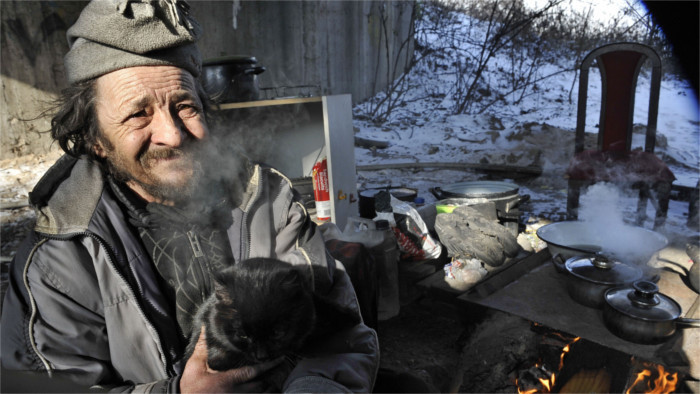For the first time ever, the city of Bratislava has carried out a survey of the homeless in the Slovak capital, in an effort to pinpoint their main problems and needs. As Rafal Kiepuszewski reports, the results of the survey will be known early next year, and they are now being processed by a team of social scientists with the help of NGOs.
The central railway station in Bratislava is not just a place commuters and long-distance travellers board trains. The upstairs waiting room is also a place where after dark, you will see a number of homeless people lie down, lining the walls. They try to get some sleep and keep warm for the night. Tonight there are a dozen of them sleeping in the waiting room, their backpacks and carrier bags tucked under their heads.
Among the volunteers involved in the survey of the homeless are those were once forced to live rough due to circumstances, but who have managed to break out of the vicious circle of poverty, drug addiction and homelessness. Marta was one of many homeless in Slovakia who slipped through the social security net when she left an orphanage. Now she helps out at a shelter for the homeless. "I reached the age of 18, and I had to leave the children's home. I had nowhere to go. I was reall down. I fell as low as you can get in life. I started doing drugs. But I've been clean now for 15 years. People tend to dump the homeless in one category, and it's not like that. Many of the homeless are people who were brought up in an orphanage. People who have nowhere to go. In fact, we have plenty of them here at our shelter," Marta said.
Slipping through the social security net
Local authorities in Bratislava are keenly awaiting the results of the survey, because as the city's mayor Ivo Nesrovnal admits, the scale of homelessness could be bigger than expected, and the resources available to deal with it are insufficient."According to estimates, there could be between 3,000 and 6,000 people living rough in Bratislava. Many of the homeless come from outside the capital. And yet, Bratislava needs to tackle the problem on its own, both in terms of finances and human resources. It's all up to us to organise," Ivo Nesrovnal said.The mayor is hoping that the results of the survey will help the city find a solution in conjunction with the state government, to develop a social security net nobody should slip through.
Slovak President Andrej Kiska recently met with a group of the homeless from the Podunajske Biskupice centre when he invited them over for dinner at the president's office. Kiska said he was aware that up to 70 percent of the homeless lived in an orphanage.
Unemployed newspaper vendors and luggage porters
But there is one place in Bratislava, where more than just a temporary bed for the night is available for the homeless. It is the office of the Proti Prudu, or Upstream, NGO which is trying to offer solutions to problems faced by the homeless. For 15 years now, in spite of the basic facilities at its disposal, the organisation has been offering hope to those living rough in Bratislava by inviting them to distribute - at a small profit - a street magazine entitled Nota Bene published by the NGO.
The unemployed come to the Proti Prudu office every week to buy a bunch of Nota Bene magazines which they then resell in the streets of the city. Sylvia was among the first Nota Bene vendors. She admits that if it hadn't been for the scheme, she may not have found a way out of her problems. „I was lucky. I've managed to find a job. Distributing the Nota Bene newspaper did wonders for my mental state. You might say that you just stand there and offer the paper to passersby, but there's more to it than that. You discover it's really up to you how much you earn, and it makes you try harder" she said.
Zuzana Pohankova, who runs the Proti Prudu NGO, explains that apart from offering the street paper for sale to the vendors, they also run a scheme whereby the homeless serve as paid luggage porters at the central railway station. The money they earn there is used to help them relieve their debts, which usually mafe them homeless in the first place. „As an organisation, we are trying to initiate a national strategy for prevention and resolving of homelessness so that competences are assigned to different government ministries and municipalities. The latter should have financial support from the state" she explained.
Conclusions for politicians to act on
Nina Benova is a social scientist working with the Proti Prudu centre. She is involved in the Bratislava homeless survey as an analyst on a team processing data gathered by volunteers. „Officials don't deal with homelessness on an everyday basis. But when they find out about the results of this survey, I'm sure that they can act on those results to start introducing changes in the way the problem is managed at their level. And that's my objective: to provide them with a set of conclusions regarding poverty, unemployment and homelessness, which are part of one and the same problem" Benova told RSI.
Bratislava counts its homeless
Máte problém s prehrávaním? Nahláste nám chybu v prehrávači.


